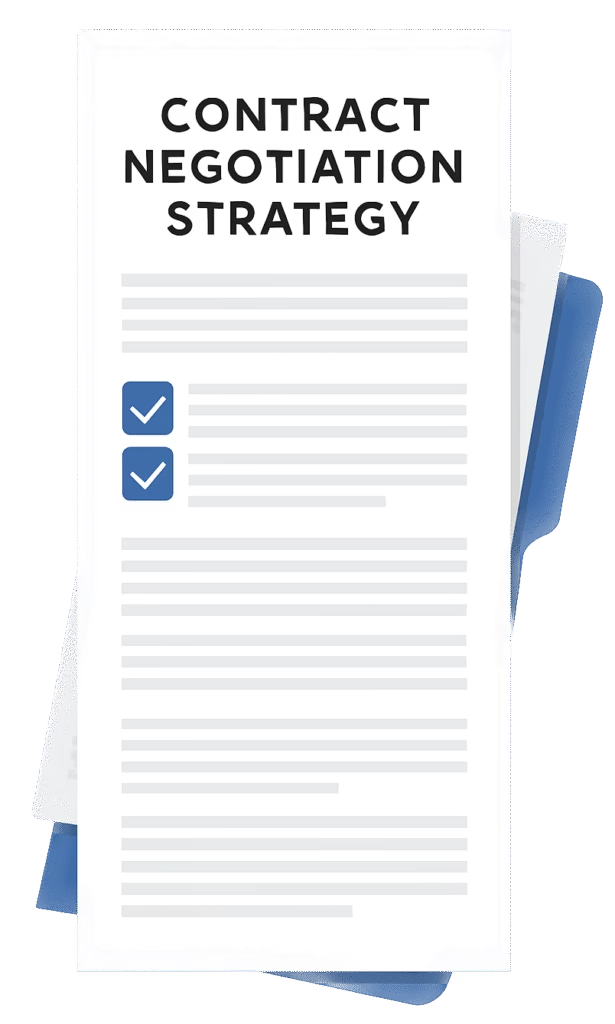Negotiating Vendor and Supplier Contracts: A Strategic Guide for Startups

Why Vendor Contracts Matter
Startups are often lean on resources, high on ambition, and short on bargaining power. Vendors—whether they provide cloud hosting, packaging, logistics, or software—play an outsized role in your ability to scale quickly and cost-effectively. Misaligned contracts can lead to cash flow problems, bottlenecks in production, or even reputational damage if service delivery fails.
Effective vendor contract negotiation isn’t about aggressive haggling—it’s about crafting agreements that support your startup’s growth trajectory while mitigating risk.
1. Secure Favorable Pricing Without Burning Bridges
Startups can’t always outspend competitors, but they can out-strategize them. Here’s how:
-
Benchmark industry rates before entering negotiations. Knowledge of market standards shows you’re informed and deters inflated pricing.
-
Ask for startup-friendly pricing tiers—lower rates now with agreed-upon increases as your usage scales.
-
Explore volume commitments in exchange for better unit costs, especially if growth forecasts are strong.
Pro Tip: Vendors often value long-term relationships. Propose longer-term partnerships in exchange for initial pricing flexibility.
2. Negotiate Smart Payment Terms to Preserve Cash Flow
Cash is king, especially in early-stage businesses. Negotiating payment terms can give your startup the breathing room it needs.
-
Net 30/60 terms are better than upfront payments. Ask for deferred payment where possible.
-
Consider milestone-based payments to align payments with performance or delivery.
-
For large purchases, leasing or installment-based agreements can reduce upfront burden.
Startups should also watch out for hidden penalties for late payments or early contract termination.
3. Use Flexibility as a Bargaining Chip
You may not have size or cash, but you do have flexibility.
-
Offer fast onboarding, quick decision cycles, and minimal red tape to sweeten the deal.
-
If you’re early in your journey, give vendors an opportunity to pilot new offerings with your team—many vendors appreciate being able to test ideas on agile teams.
In some cases, offering case study opportunities or co-branding rights can serve as an unconventional but valuable asset.
Generate A Free Contract Negotiation Strategy Document
Create a comprehensive contract negotiation strategy document using proven frameworks like BATNA, ZOPA, and other negotiation models.

4. Ensure Contracts Support Scalability
Early vendor agreements shouldn’t become liabilities as your business scales.
-
Include scalable SLAs (Service Level Agreements) to accommodate increased usage without renegotiation.
-
Build in tiered pricing or “growth clauses” to automatically adjust terms as your needs change.
-
Add a review clause that allows either party to revisit terms after a specific time or usage threshold.
Think beyond what you need now—what would this contract look like if your user base tripled in six months?
5. Avoid Lock-Ins and Overdependence
Vendor lock-in can stunt your flexibility and negotiating leverage.
-
Avoid exclusivity clauses unless there’s a substantial benefit.
-
Ensure exit clauses are clearly defined and not punitive. Include reasonable notice periods and transition support.
-
Negotiate for data portability if services involve your IP or customer data.
Where possible, have at least one backup vendor identified and a continuity plan in place.
6. Clarify Responsibilities, Delivery, and Quality
Be specific. Ambiguities lead to disputes.
-
Define delivery timelines, quality benchmarks, and remedy clauses.
-
Include penalties for late or substandard delivery, especially for critical inputs.
-
If possible, conduct a trial phase before fully committing.
Even with small vendors, it’s essential to document everything—verbal understandings don’t hold in conflict.
7. Make Relationships, Not Just Transactions
The best vendor deals are partnerships.
-
Invest in the relationship with open communication and fair dealing.
-
Share your vision and invite them to be part of your growth story.
-
A trusted vendor can evolve into a strategic ally—offering preferential treatment, innovation support, or referrals.
A strong vendor relationship often translates into better service, priority access, and flexible support when you need it most.
Final Thoughts
Vendor and supplier contracts form the backbone of operational stability in startups. Negotiating them smartly requires a blend of business savvy, legal awareness, and long-term thinking. The goal isn’t just to save money—it’s to build a vendor network that scales with you, protects you, and contributes to your success.
As a founder or startup operator, invest the time to learn the language of contracts. Get legal guidance when necessary, and always, always negotiate from a position of clarity, not desperation.
- RamenLegal
- RamenLegal



